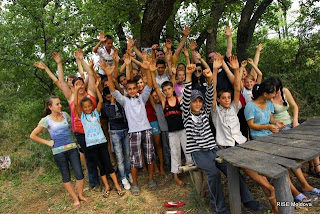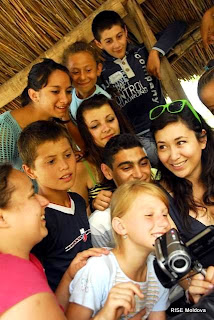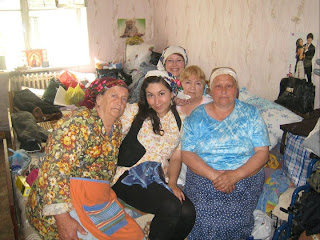







a lot! I hope... :)








 RISE's "Roma Boots" drop will forever be in my memories as one of the best things I have done thus far in my Peace Corps service.
RISE's "Roma Boots" drop will forever be in my memories as one of the best things I have done thus far in my Peace Corps service.











 We made a nice assembly line of food and handed out canned goods, fresh veggies and fruit, we were even able to hand out some frozen chickens as well!
We made a nice assembly line of food and handed out canned goods, fresh veggies and fruit, we were even able to hand out some frozen chickens as well!





 So today after a long Gmail internet phone call we have decided that one month from now she will be riding a bicycle FARA (without) training wheels or assistance!!
So today after a long Gmail internet phone call we have decided that one month from now she will be riding a bicycle FARA (without) training wheels or assistance!! 




 Marion Adams
Marion Adams

TITLE: Brown is Dirty Color, Fighting for Roma (Gypsy) Awareness
“Ms. Marlene dont use the color brown! Yelled one of my former third graders, “Its a dirty color, its the “Tigan” (gypsy) color, if your that color your a bad person.”. This just before I was about to color in one of my vocabulary charts. After a moment to reflect I responded with “Are you sure that all brown people are bad?” now several engaged children responded with a whole hearted “Yes” to which I said, “hmmm would you guys like to see my mother?” Yes they said and I proceeded to show them the following picture:

I've never seen children's cheeks turn red so fast. Baffled and embarrassed that my mother was a brown Mayan looking women they retreated and said well not all brown people can be bad. This was it, the moment when I realized I needed to do some Roma work!
Roma consistently fall behind their non-Roma counter-parts in regards to educational success, employment, health, housing conditions, and security. Compared to their non-Roma counter-parts Romas face: a two times higher risk of poverty, a higher illiteracy and drop out rate, two-times higher probability of unemployment, fall short on all core health indicators relevant to the human development index, 80 percent live in homes with no basic housing conditions, and two thirds of the population frequently suffer from food insecurity.
But the intolerance and stigma surrounding the Roma have also greatly held back their
progress and self-confidence.

The film has been used in several villages to facilitate discussions about the issues with the Roma community, it was shown at the Council of Europe by Marin Alla to begin deliberations about the Roma in Europe, and its even been featured on national television here in Moldova.

All great successes, but my most memorable success with this film happened on a random day at site with my host mother.
We had just finished a cup of afternoon tea when I said I was off to Chisinau (Moldova's capital city) for a meeting. Naturally she asked about my work and I admit I hesitated to tell her that my Roma partners were waiting for me to discuss our film. I had heard several comments about Roma in our home “dont go near them, they'll steal from you” “oh what a shame she married a Tigan” “They sell their young!” all sorts of things, but I decided it was time to share this part of my life with the women I had grown to love and respect. When I told her about my project this set in motion a two hour debate between her and I.
It was a very emotional discussion she brought up cases of Roma stealing from her when she was a child, than it got tied into the hardships of the war etc etc and it became very clear to me that she wasn't going to give me an inch on this topic.
But then, just before I was about to give up I caught a break she said “ I have never seen a Roma who is educated and can properly speak to people.” “Really!” I said and asked her if I can show her something, (Im very big on showing, its so much more effective than talking sometimes!) and to my joy she agreed.
I watched her face as she watched our film, there on the screen was a Roma who could speak, who was intelligent and passionate and I can tell it was sinking in. Afterwards, she sat there and reflected, and not a word passed between us for several minutes. I had to capture the moment and got a snap shot of this moment here it is:
But it was agonizing to wait for her to speak, and when she did it was a relief to hear her say “wow I dont think I have ever seen a Roma speak that way before, Maybe they have changed” which she quickly countered with “but if there are good Roma they are not in Hincesti (our town)”. I was so happy I nearly cried.
Many people don't understand why this experience meant so much to me, they say at the end of the day, she still disliked Roma, but to them I say “patience”. As Peace Corps volunteers we constantly hear that our jobs are not meant to change things immediately rather we plant seeds that will bloom with time. She gave me an inch, one tiny inch and it was enough to plant a seed. Rarely do we get the opportunity to see this happen and I will never forget her for it. I sincerely believe its these random events, these moments of patience and perseverance that truly fulfill our goals of peace and friendship.